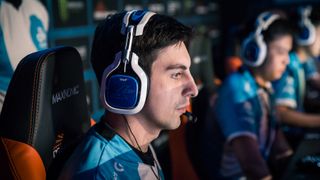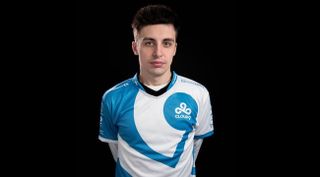For shooter wunderkind Shroud, esports fame was a stop on the way to Twitch superstardom
Shroud's retirement at 23 holds a message for the esports scene: for the fearsomely talented, streaming on Twitch is a more lucrative career.

Shroud would like to make it clear that he knows he's still really, really good. Yes, he doesn't belong to an esports organization anymore, and yes, it's been a long time since he's suited up in his sky-blue Cloud9 duds to take on the world at ESL, or Dreamhack, or anything in between. But frankly, I trust him when he says the world will always be his for the taking. As one of the most talented FPS players in the world, he hasn't been wrong yet.
Shroud has that something that separates practice, hard work, and good coaching from miraculous superstardom. You could never be Shroud.
"I think I could pull it off in Counter-Strike," says Michael "Shroud" Grzesiek, in a private Discord call, when I ask him how quickly he thinks he could conquer the competitive scene of a shooter he's interested in. "It might take a little bit more work there, I haven't played Counter-Strike in a long time," he admits. "But I don't think it'd take me long to be back on top."
Today, Shroud is the proprietor of one of the most popular Twitch channels on the site, which puts him in the company of a pretty diverse group. There are streamers who cultivate a friendly group of sycophants through a genial attitude and smart promotion. There are streamers who've built a brand through their own capriciousness, and convince thousands to tune in for the off-chance of witnessing a live, ugly, permaban-summoning meltdown. There are trollish puppet-masters who taunt the fringes of taste, there are SEO-minded capitalists who optimize their broadcasts for fickle elementary school kids on lunchbreak, and there are career grifters who bounce from hot game to hot game in hopes of picking up a few curious clicks along the way.
But Shroud man, Shroud is different. It's hard to spend a 9-5 job doing exactly one thing—in this case, playing endless rounds of PUBG—without getting pretty good, so most of the personalities on Twitch are capable players. However, Shroud is one of the few streamers to take his craft to artisan levels. I don't know if you can be born to play shooters—in the same way you and I might talk about the sanctified talent of LeBron James or Lionel Messi—but just watch him rack up 30 kills in a round of PUBG duos, or clear out nearly a quarter of the map population in a game of Fortnite.
It is awe inspiring. Impossible to articulate. It makes ebullient praise spill from the mouths of casters all over the world. Sure, at the end of the day, Shroud is just mowing down a legion of jabronis using a mouse and a keyboard, but it still makes you consider that something that separates practice, hard work, and good coaching from miraculous superstardom. You could never be Shroud. You could never be Michael Jordan.
It's strange then, that someone so unimpeachably awesome is now enjoying the first month of his esports retirement. Shroud racked up over $200,000 during the three years he played Counter-Strike and Battlegrounds for Cloud9, and last month, at the tender age of 23, he announced that he was leaving competitive gaming behind for good. "Moving forward, I'm going to be focusing my energy on a new challenge, streaming and pushing myself to create awesome content for my fans around the world," he wrote on his Twitter account.
Blizzard, Riot, Valve, and the rest of the pro scene are up against the harsh reality that someone like Shroud can make more money, and live more freely, on his own.
If you follow Twitch closely you could see this coming. Shroud already has over 33,000 subscribers, and was featured less and less in Cloud9's esports portfolio over the past year. Today, he's one of the marquee signings of Loaded.gg, a self-described "gamer influencer agency" that appears to angle itself as a sort-of CAA for Twitch power brokers. It might seem strange that Shroud is wrapping a historic career in competitive gaming while he's still right in the middle of his prime, but generally, when people leave on their own terms, they're not shedding any tears.
The biggest gaming news, reviews and hardware deals
Keep up to date with the most important stories and the best deals, as picked by the PC Gamer team.
"I do miss playing on the big stage, to be able to hear the crowd roar in the stadium. But I don't miss competing," he admits. "In four years as a pro gamer, I had a lot of highlights, but in the back of my mind I wanted to continue streaming, because [before] I had to juggle both jobs. I wanted to be my own boss. I didn't want to travel anymore. I was travelling for five years, and I just don't like it."
Think about it from his perspective. Shroud has been great at shooters forever. As a teenager his dream was to make it as a pro gamer—a truly ambitious goal, considering how, at the time, there wasn't anything close to the well-oiled esports infrastructure we have today—but luckily, he came of age right when Counter-Strike was deep in its second renaissance. His parents were cautiously supportive, and then voraciously supportive, as he managed to see his dream up close. Shroud is now both famous enough and respected enough to do whatever he wants. As it turned out, he wants a good, long break.
The pan is viable. That is all. pic.twitter.com/5AxWwscBVSApril 3, 2018
It doesn't set a great precedent for esports that someone like Shroud, unanimously understood as a player capable of making any roster in North America, felt happier outside of the volatile tournament grind. You'd hope that this industry could hold onto 23-year old talent, especially someone who's a legitimate live event draw.
Blizzard, Riot, Valve, and the rest of the pro scene are up against the harsh reality that someone like Shroud can make more money, and live more freely, on his own. It's an ouroboros of new media; it's The Rock leaving WWE; all these companies want to create stars, but what happens when those stars see the artificial limits for what they are?
I asked Shroud if he thinks there's something the esports business can improve upon to keep people like him from burning out. Unsurprisingly, he couldn't come up with an easy answer.
"It kinda depends on the person. Some people love the travelling all across the world. But there's people like me, who didn't like that, but liked the online stuff and living in a team house," ponders Shroud. "I don't know if there's one thing that'd make it better for everyone."
[Twitch chat is] trying to make you laugh, or they're trying to piss you off. And if they're trying to piss you off, you should laugh.
Shroud
Shroud isn't sure what the future holds. He left Canada years ago to relocate to a cozy alabaster house in Los Angeles, which looks to be in a constant state of bachelor-pad unrest, judged by the ravioli-sized facecam in the corner of his streams. (For the record, his favorite thing about the west coast is the food.) He streams for a healthy eight hours a day, and never seems like he's on the edge of burnout.
These days he's playing mostly Battlegrounds and Fortnite—the two games that made him truly world famous—and he tells me that as long as publishers keep putting out battle royales, he'll continue to experiment with them. Shroud also disagrees that we're approaching a MOBA-style maximum capacity for the genre—he'd be interested in a Battlefield or a Call of Duty battle royale (seems inevitable), or maybe something set in a sci-fi or fantasy universe (less likely, but there's rumors swirling about a Red Dead Redemption 2 survival mode. We can dream).
"I'd love to see something with destructible environments," says Shroud, when I ask him if he has a specific mechanic he'd like to see in the battle royales that are inevitably on the horizon. "It'd change the way those games are played so much. Someone is camping inside the house, and you just blow that wall down."

Clearly, the biggest winner in this situation is Twitch. As an arbiter of the culture, Shroud has kept his nose clean as long as he's been active, avoiding the blindingly obvious pitfalls that have damaged the careers of all-stars like Dr. Disrespect, Tyler1, and practically half the Overwatch League. He chalks up other people's mistakes to the enveloping noxiousness of Twitch chat, and its devious ability to follow you everywhere. "You're reading it everyday, and a lot of it isn't nice. … it goes to Twitter, to Instagram, if you play a game off-screen it shows up there. Eventually it might get to you," he says.
"I laugh at every single message, because most of the time it isn't serious. They're trying to make you laugh, or they're trying to piss you off. And if they're trying to piss you off, you should laugh."
It's a simple strategy, one that's echoed by countless other people in the scene, and it's only going to get more important as Shroud pushes all his chips into his streaming career. At the very least, he knows what he's up against.
By hanging up the pro gloves, Shroud has returned to his roots. A gamer in a bedroom, chilling, eyeing the Steam release schedule. He traveled around the world, and couldn't shake the gravitational pull back home, with his friends, with no practice schedules or promo appointments. Some players find their muse at IEM Katowice. Some want to extend the utopia of a high school summer break for the rest of time. I can't really argue Shroud's made the right choice. After all, isn't this what retirement is supposed to look like?

Luke Winkie is a freelance journalist and contributor to many publications, including PC Gamer, The New York Times, Gawker, Slate, and Mel Magazine. In between bouts of writing about Hearthstone, World of Warcraft and Twitch culture here on PC Gamer, Luke also publishes the newsletter On Posting. As a self-described "chronic poster," Luke has "spent hours deep-scrolling through surreptitious Likes tabs to uncover the root of intra-publication beef and broken down quote-tweet animosity like it’s Super Bowl tape." When he graduated from journalism school, he had no idea how bad it was going to get.
Most Popular



